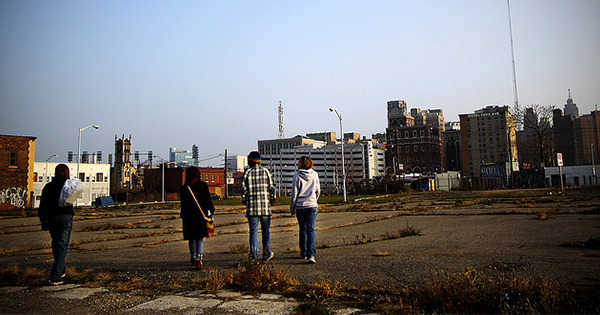
Nature is free for everyone to enjoy. So you’d think, but in truth there is a growing divide over who has access to the natural world. A British study found that families need to earn an annual income of around £45,000 ($51,000)—considerably more than the national average—before they felt they had access to areas of natural beauty.
The world is becoming increasingly urban. In 1800, just three percent of the world’s population lived in cities. Today more than half of us do, and by 2050, 75 percent of us will. Wealthier people tend to live in greener areas with gardens, nicely tended parks, and wide, tree-lined boulevards. They have the money and time to visit the countryside and to travel to areas with wildlife and natural beauty overseas. By contrast, poorer parts of cities tend to be uglier, more cramped, and blighted by litter, tagging, pollution, and decay. Poor people are less likely to have the funds and leisure time to visit more attractive places and may feel that national parks and the like are “not for them”—not aimed at their social class or group.
On my travels around the world, I have found some of the poorest people living in some of the most outstandingly beautiful places. Although a tourist finds it easier to recognize the extraordinary in a resident’s ordinary, these people were not blind to their landscapes and many natural features are worshipped by locals.
But in humanity’s great urban migration, we are increasingly privatizing nature or making it less accessible in other ways. We are in danger of creating a world in which nature is just another plaything to be enjoyed by the privileged few.
When I was a child, school trips were organised to the seaside, the countryside, and to museums—the only opportunities many poor children had to visit these places. Children played outside on school grounds or on vacant lots and parks. Now, school trips are less frequent, after-school play is limited by parents who fear for their children’s safety, and vacant lots have all been built up as property values have risen. Children now gather in shopping malls, where even the vegetation is plastic.
Democratizing nature needn’t be difficult or expensive. Maintaining clean and safe parks for people to enjoy has multiple social benefits. A positive local experience in parks and gardens, for example, may encourage people to appreciate and learn more about the greater natural world.
The alternative is bleak. If people do not think nature is for them, they are unlikely to value it. And if they do not value their small, local, sanitized version, what hope remains for the rest of this wild world?

